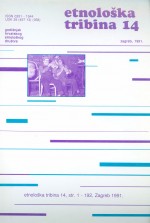Pitao je "da li ga vide" i zaželio "da ga dogodine ne bi vidjeli"
He Asked "Whether They Saw Him" and Wished "That They Didn't See Him the Following Year"
Author(s): Jasna AndrićSubject(s): Christian Theology and Religion, Customs / Folklore, Cultural Anthropology / Ethnology
Published by: Hrvatsko etnološko društvo
Keywords: custom; religion; oral tradition; anecdotes; Slavic priests;
Summary/Abstract: The contribution contains a part of a possible analysis of data concerning the custom of someone hiding behind bread, grain or something else, asking others whether they see him. Most frequently this person wished not to be seen the following year. By its basic interpretation it would be a magical procedure for ensuring abundant crops. The correspondence of that custom with that performed by Slavic priests in front of the temple of Svantevid on the island of Rügen ( based on a description from the 12th c. ) was attested a long time ago. Available data from south-eastern Europe are being presented (from Bosnia and Herzegovina, Monte Negro, Serbia, Macedonia, Bulgaria, Romania and Greece). They are not numerous and appear sporadically, though in recent decades there are more and more such data. They could be sorted out into four groups: 1) descriptions of the contemporaneous custom (frequently without information about the circumstances of its recording); 2) descriptions of the custom which was performed in the past; 3) oral tradition with the motif of hiding, frequently with at least a part of the usual dialog; 4) anecdotes and jokes with the same motif (at the expense of peasants from other villages, members of other ethnic or religious groups, famous persons). Records from the third and fourth group (to some extent also those from the second) bear testimony to a possibility that we are dealing here with a part of oral tradition rather than with a custom. In some records (from Macedonia and Greece, partly from Bulgaria and in one from the Croatian littoral) there is a more or less pronounced hint at the ambiguity of the wish of the person who does not want to be seen. The magic which should provoke abundance and fertility can cause death. This was said in the record from the 12th c. : the priest who wished not to be seen the following year »did not ask for his or the people’s death, but for the abundance following harvest«.
Journal: Etnološka tribina : Godišnjak Hrvatskog etnološkog društva
- Issue Year: 21/1991
- Issue No: 14
- Page Range: 77-84
- Page Count: 8
- Language: Croatian

